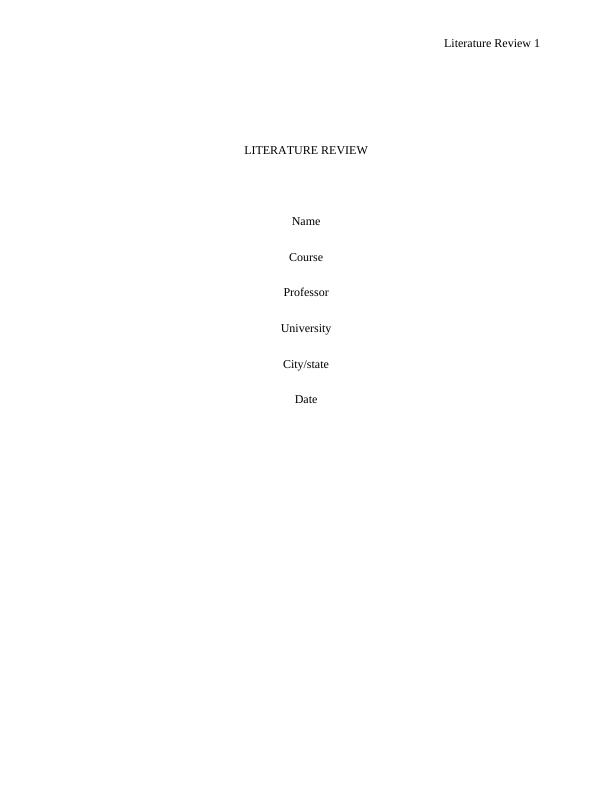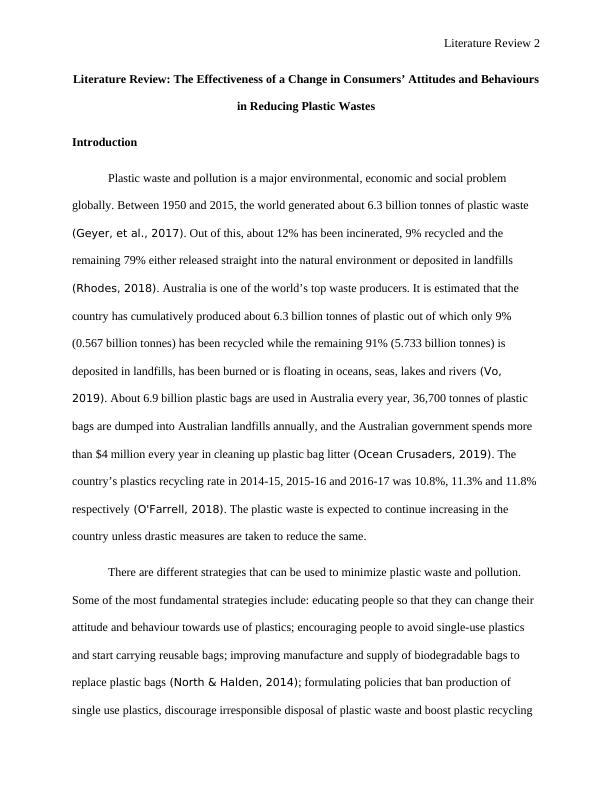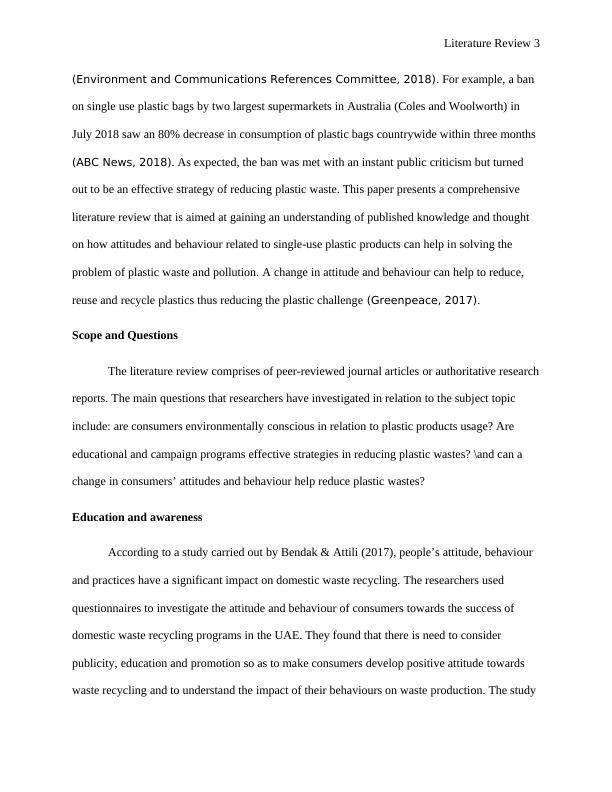Attitudes and Behaviours in Reducing Plastic Wastes
Added on 2022-09-18
10 Pages2563 Words22 Views
Literature Review 1
LITERATURE REVIEW
Name
Course
Professor
University
City/state
Date
LITERATURE REVIEW
Name
Course
Professor
University
City/state
Date

Literature Review 2
Literature Review: The Effectiveness of a Change in Consumers’ Attitudes and Behaviours
in Reducing Plastic Wastes
Introduction
Plastic waste and pollution is a major environmental, economic and social problem
globally. Between 1950 and 2015, the world generated about 6.3 billion tonnes of plastic waste
(Geyer, et al., 2017). Out of this, about 12% has been incinerated, 9% recycled and the
remaining 79% either released straight into the natural environment or deposited in landfills
(Rhodes, 2018). Australia is one of the world’s top waste producers. It is estimated that the
country has cumulatively produced about 6.3 billion tonnes of plastic out of which only 9%
(0.567 billion tonnes) has been recycled while the remaining 91% (5.733 billion tonnes) is
deposited in landfills, has been burned or is floating in oceans, seas, lakes and rivers (Vo,
2019). About 6.9 billion plastic bags are used in Australia every year, 36,700 tonnes of plastic
bags are dumped into Australian landfills annually, and the Australian government spends more
than $4 million every year in cleaning up plastic bag litter (Ocean Crusaders, 2019). The
country’s plastics recycling rate in 2014-15, 2015-16 and 2016-17 was 10.8%, 11.3% and 11.8%
respectively (O'Farrell, 2018). The plastic waste is expected to continue increasing in the
country unless drastic measures are taken to reduce the same.
There are different strategies that can be used to minimize plastic waste and pollution.
Some of the most fundamental strategies include: educating people so that they can change their
attitude and behaviour towards use of plastics; encouraging people to avoid single-use plastics
and start carrying reusable bags; improving manufacture and supply of biodegradable bags to
replace plastic bags (North & Halden, 2014); formulating policies that ban production of
single use plastics, discourage irresponsible disposal of plastic waste and boost plastic recycling
Literature Review: The Effectiveness of a Change in Consumers’ Attitudes and Behaviours
in Reducing Plastic Wastes
Introduction
Plastic waste and pollution is a major environmental, economic and social problem
globally. Between 1950 and 2015, the world generated about 6.3 billion tonnes of plastic waste
(Geyer, et al., 2017). Out of this, about 12% has been incinerated, 9% recycled and the
remaining 79% either released straight into the natural environment or deposited in landfills
(Rhodes, 2018). Australia is one of the world’s top waste producers. It is estimated that the
country has cumulatively produced about 6.3 billion tonnes of plastic out of which only 9%
(0.567 billion tonnes) has been recycled while the remaining 91% (5.733 billion tonnes) is
deposited in landfills, has been burned or is floating in oceans, seas, lakes and rivers (Vo,
2019). About 6.9 billion plastic bags are used in Australia every year, 36,700 tonnes of plastic
bags are dumped into Australian landfills annually, and the Australian government spends more
than $4 million every year in cleaning up plastic bag litter (Ocean Crusaders, 2019). The
country’s plastics recycling rate in 2014-15, 2015-16 and 2016-17 was 10.8%, 11.3% and 11.8%
respectively (O'Farrell, 2018). The plastic waste is expected to continue increasing in the
country unless drastic measures are taken to reduce the same.
There are different strategies that can be used to minimize plastic waste and pollution.
Some of the most fundamental strategies include: educating people so that they can change their
attitude and behaviour towards use of plastics; encouraging people to avoid single-use plastics
and start carrying reusable bags; improving manufacture and supply of biodegradable bags to
replace plastic bags (North & Halden, 2014); formulating policies that ban production of
single use plastics, discourage irresponsible disposal of plastic waste and boost plastic recycling

Literature Review 3
(Environment and Communications References Committee, 2018). For example, a ban
on single use plastic bags by two largest supermarkets in Australia (Coles and Woolworth) in
July 2018 saw an 80% decrease in consumption of plastic bags countrywide within three months
(ABC News, 2018). As expected, the ban was met with an instant public criticism but turned
out to be an effective strategy of reducing plastic waste. This paper presents a comprehensive
literature review that is aimed at gaining an understanding of published knowledge and thought
on how attitudes and behaviour related to single-use plastic products can help in solving the
problem of plastic waste and pollution. A change in attitude and behaviour can help to reduce,
reuse and recycle plastics thus reducing the plastic challenge (Greenpeace, 2017).
Scope and Questions
The literature review comprises of peer-reviewed journal articles or authoritative research
reports. The main questions that researchers have investigated in relation to the subject topic
include: are consumers environmentally conscious in relation to plastic products usage? Are
educational and campaign programs effective strategies in reducing plastic wastes? \and can a
change in consumers’ attitudes and behaviour help reduce plastic wastes?
Education and awareness
According to a study carried out by Bendak & Attili (2017), people’s attitude, behaviour
and practices have a significant impact on domestic waste recycling. The researchers used
questionnaires to investigate the attitude and behaviour of consumers towards the success of
domestic waste recycling programs in the UAE. They found that there is need to consider
publicity, education and promotion so as to make consumers develop positive attitude towards
waste recycling and to understand the impact of their behaviours on waste production. The study
(Environment and Communications References Committee, 2018). For example, a ban
on single use plastic bags by two largest supermarkets in Australia (Coles and Woolworth) in
July 2018 saw an 80% decrease in consumption of plastic bags countrywide within three months
(ABC News, 2018). As expected, the ban was met with an instant public criticism but turned
out to be an effective strategy of reducing plastic waste. This paper presents a comprehensive
literature review that is aimed at gaining an understanding of published knowledge and thought
on how attitudes and behaviour related to single-use plastic products can help in solving the
problem of plastic waste and pollution. A change in attitude and behaviour can help to reduce,
reuse and recycle plastics thus reducing the plastic challenge (Greenpeace, 2017).
Scope and Questions
The literature review comprises of peer-reviewed journal articles or authoritative research
reports. The main questions that researchers have investigated in relation to the subject topic
include: are consumers environmentally conscious in relation to plastic products usage? Are
educational and campaign programs effective strategies in reducing plastic wastes? \and can a
change in consumers’ attitudes and behaviour help reduce plastic wastes?
Education and awareness
According to a study carried out by Bendak & Attili (2017), people’s attitude, behaviour
and practices have a significant impact on domestic waste recycling. The researchers used
questionnaires to investigate the attitude and behaviour of consumers towards the success of
domestic waste recycling programs in the UAE. They found that there is need to consider
publicity, education and promotion so as to make consumers develop positive attitude towards
waste recycling and to understand the impact of their behaviours on waste production. The study

End of preview
Want to access all the pages? Upload your documents or become a member.
Related Documents
Investigating Australian Consumers' Knowledge of Recycling Single Use Plasticslg...
|9
|2889
|143
Corporate Social Responsibility and Plastic Pollutionlg...
|8
|2120
|260
Removal of Plastic from Oceanslg...
|6
|1519
|100
Sustainability Management and Marketinglg...
|10
|2604
|84
The Significance of Plastic Industrylg...
|13
|3020
|410
GEOGRAPHY. GEOGRAPHY. 3. 3. : GEOGRAPHY. Introduction tlg...
|4
|498
|59